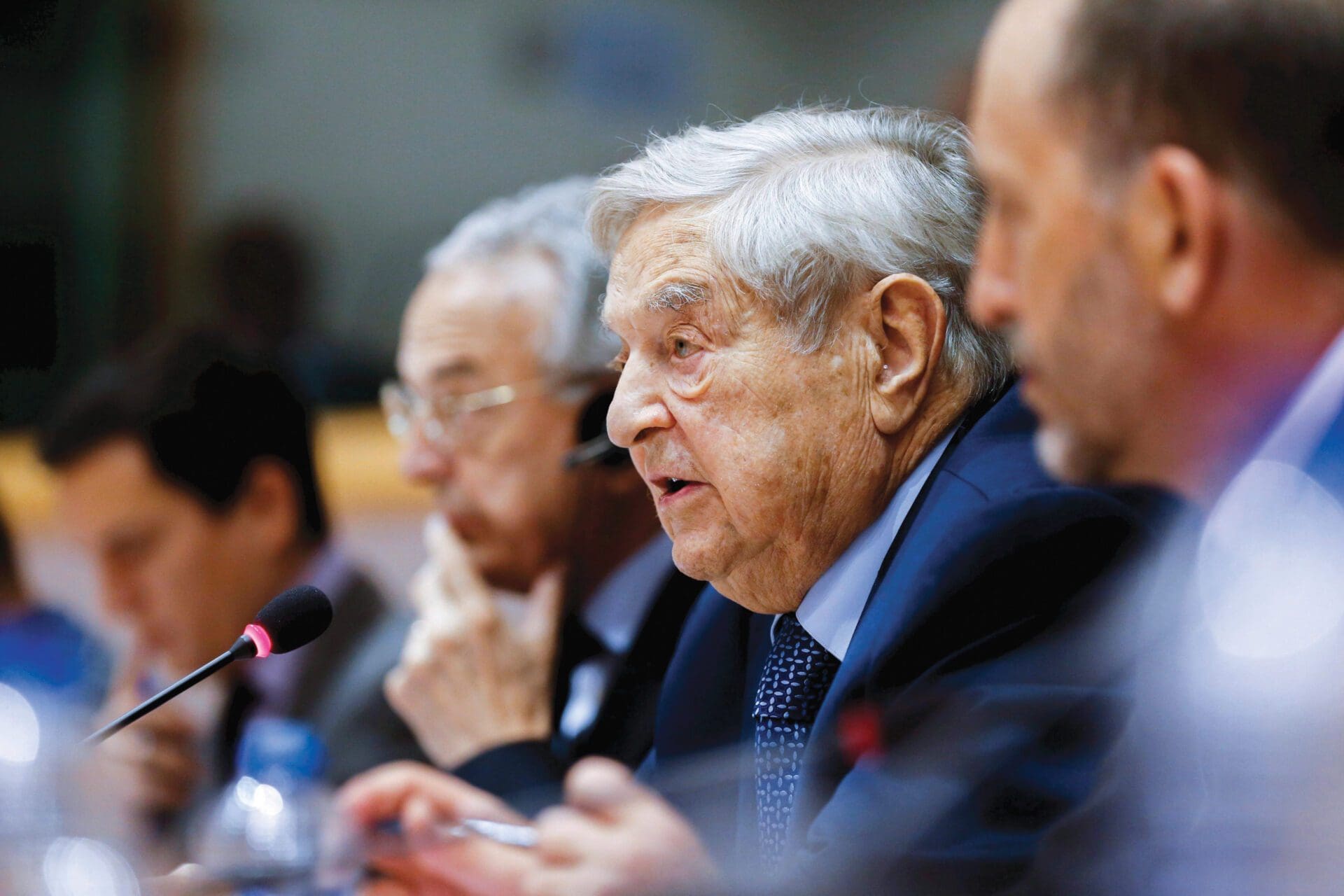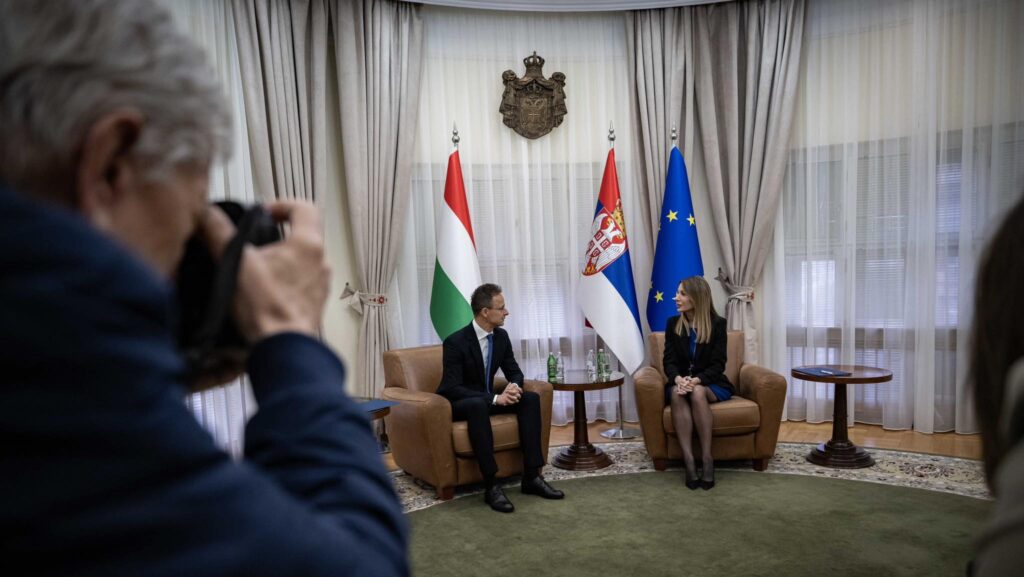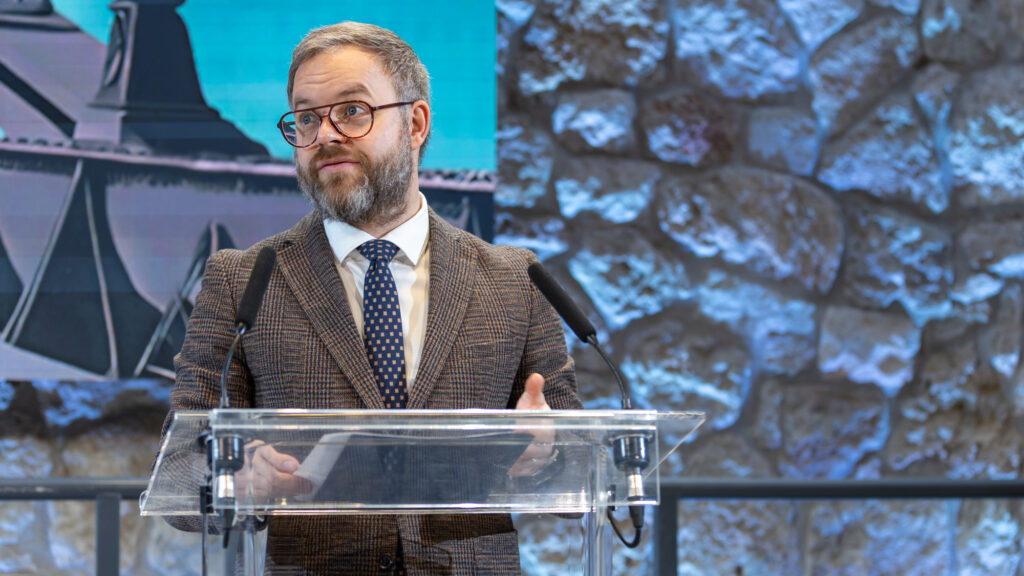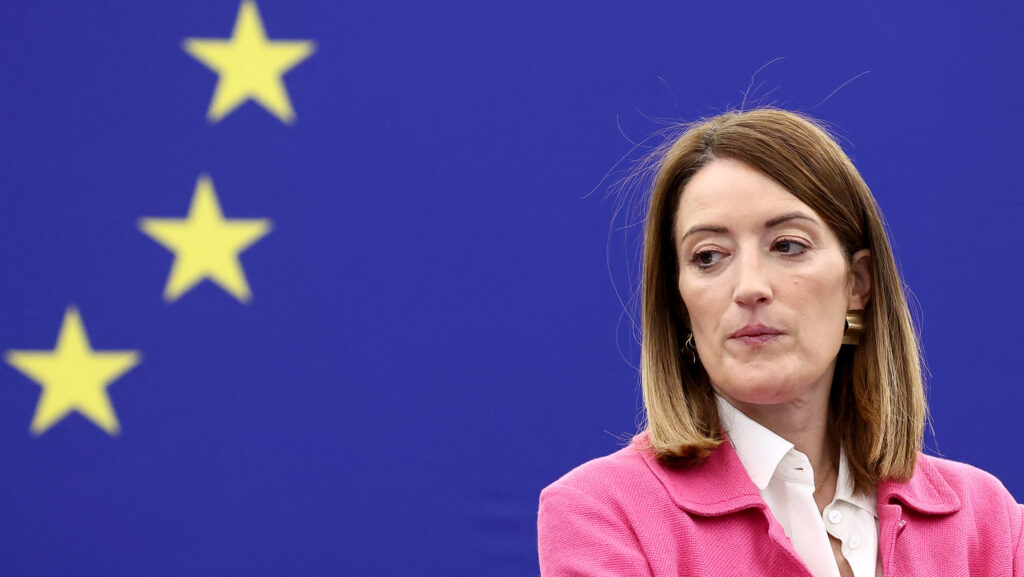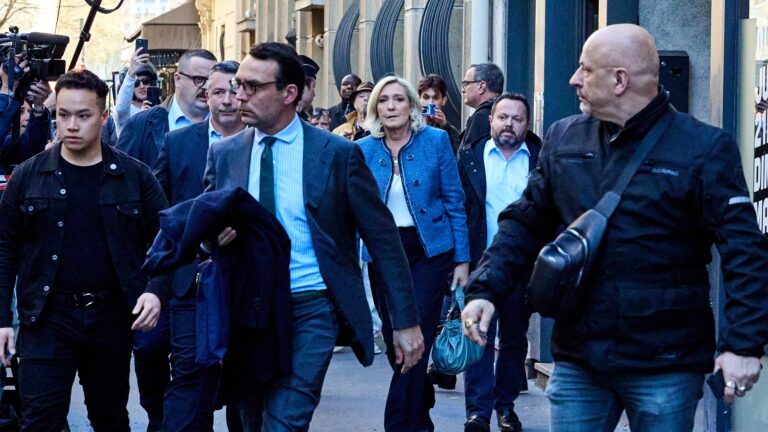Prime Minister Viktor Orbán scored a crushing victory in the Hungarian parliamentary elections on 3 April 2022, which secured for him a fourth consecutive term. Soon after the elections, the European Union triggered the Rule of Law Mechanism, enabling the imposition of financial sanctions against Hungary. The Open Society Foundations (OSF) played an important role in activating the mechanism. The current article describes the conflicts that exist between the Hungarian conservative government defending national interests and policies used by the OSF to interfere in Hungary’s domestic affairs. The aims of the OSF will be interpreted in the context of history, culture, and geopolitics.
Soros is donating to around 200 organizations in more than 120 countries in Europe
The OSF were established by George Soros, a Hungarian-born American investor. Today, the OSF have branches in 37 countries and operate with an annual budget of one billion US dollars. In addition, Soros is donating to around 200 organizations in more than 120 countries in Europe, Asia, Africa, and the Americas. For decades, Soros has been a strong advocate of democracy, freedom, human rights, and the ideals of the open society. His actions are carried out by non-governmental organizations—in effect, disguised political actors—who have gained influence in several countries and conduct anti-government activities.1
Soros established his foundation in Budapest almost forty years ago and launched wide-ranging educational support for, among others, scholars living in poor conditions by offering them international and domestic scholarships, and delivered milk to schoolchildren. His foundation also financed the publication of political and literary journals across the country, which advocated changing to a Western style democracy, and called for a multi-party system and free elections. The journals were distributed by intellectuals who had direct connections to the foundation’s staff and organized anti-government demonstrations that were disbanded by law enforcement agencies. The protest organizers and keynote speakers were arrested for their attempts to destabilize the country’s political and social order. At this time, Hungary was part of the Soviet Bloc, so support for Soros’s foundation for the aforementioned publications was illegal, and was seen as anti-state activity.
With the advent of democracy, the OSF office was reorganized and became an independent legal entity in Hungary. In 1993, the Open Society Institute (OSI) also started its activity as the Budapest-based administrative and operational headquarters for a number of initiatives. The OSI provided financial and technical support to Soros’s foundation. The Central European University (CEU) was established in Budapest in 1991 with the aim of promoting Western democratic ideals among young generations who were seen as future representatives of the political, business, academic and cultural elite of Central Europe. The CEU also encouraged critical thinking about countries considered to be under authoritarian rule or posing a threat to US geopolitical interests. After the regime change, the Soros Foundation and the OSI, now with greater capacity, could reach out to a larger number of Hungarian civil actors, including NGOs. These outreach programmes provided foreign and domestic scholarships, support for journalists, and research funding. The OSF established a network that became a closed community of scholars and civil activists almost hermetically separated from the rest of the society. People could join this elite club only through confidential and friendly relationships. The club members distrusted other political and social groups, whose philosophy of life was deeply rooted in conservative Central and Eastern European values. This attitude explains why the Soros-supported organizations were unable to attract widespread political support from Hungarian society.
It is also a complex issue and a matter of debate why the activities of Soros’s network, marked by generous aid projects and charity activities, were accompanied by increased political activism in Hungary. It was said that new democracies are fragile; the democratic institutional systems had to be consolidated and civil societies strengthened. In the early 2000s, when Hungary moved closer to EU membership, Soros began to indicate that there was less need for his activities to be maintained in the country. In fact, the political conditions had changed fundamentally when Hungary joined the EU in 2004. Accession also meant that the Union’s institutions took over competences and powers for defending democracy, human rights, and fundamental freedoms. Therefore it could be surmised that Soros had completed his mission in Hungary. Nevertheless, when Viktor Orbán returned to power in 2010, the political activism of the OSF-network turned into an anti-government campaign carried out in collaboration with some Hungarian NGOs. Orbán referred to the respective civil organizations as paid political activists attempting to enforce foreign interests in Hungary.2 As for the conflicts of interest between the Soros network and Orbán’s government, three key areas can be identified: support for NGOs to exert political influence; media support; and the use of coercive measures for European policymaking.
Support for NGOs to Exert Political Influence
There are several types of civil organizations receiving funding from the global network of the OSF, including NGOs established in Hungary and international NGOs. With respect to the latter group, the Soros foundations offer financial support to internet activist networks. This group is represented by Avaaz, a New York-based global online activist platform,3 which placed paid anti-government advertisements on Hungarian social media sites during the 2018 Hungarian parliamentary election campaign. Avaaz also used Facebook and Messenger to find followers in Hungary, and sent them a circular letter stating that the organization would intensify its anti-government campaign. It was generally believed that Avaaz was seeking to circumvent Hungarian election law by practising externally launched political advertising.4 Four days before the elections, Avaaz was on the offensive again. It resumed its campaign on Facebook and sent circular emails across the country, promoting opponents to the pro-government candidates in each electoral district.
With respect to Hungarian NGOs, it may be worthwhile to give a brief historical outline. The comparatively small number of Hungarian political activists and scholars who managed to get into the OSF-network at the time of the political transition were later placed by the Foundations in influential positions within different NGOs. In this way, the Soros-backed civil organizations gained influence, among others, in the domain of the European funding system (Active Citizens Fund). ThoseNGOs which were attached to the OSF were selected to distribute grants from the Fund to finance various kinds of projects in Hungary, from environmental protection and business development to education. Critical voices arose, saying that the implementation of the Fund was not transparent, and Hungarian civil organizations which were involved in the funding applied double standards and were subject to political influence. From 2014, the Hungarian authorities carried out investigations against those NGOs and, as a result, the government stopped the activities of Soros-backed organizations in the distribution of the Fund in Hungary. Today the OSF occupy an influential position in managing the Active Citizens Fund in other European countries. The Soros foundations are consortium leaders responsible for allocating the Fund in Poland, the Czech Republic, and Bulgaria. In addition, the OSF are participating in the implementation of programmes supported by the Fund in Slovakia, Estonia, and Lithuania. 5
As regards other Hungarian civil organizations, this group includes NGOs which have been engaged in political issues, such as the Hungarian Helsinki Committee (HHC), which receives donations from the OSF every year.6 The HHC was actively participating in anti-government actions. It called on voters to boycott the 2016 Hungarian migrant quota referendum. The HHC also issued reports about its activists who were protesting against Orbán while he delivered a speech, or when they damaged campaign advertisement posters of the government during the 2018parliamentary elections.7 After the elections, the Orbán government adopted a legislative package regulating the operations of NGOs in Hungary, stipulating that legal persons must bear the consequences of their decisions if they provide assistance to migrants staying illegally in Hungary.
As part of the legislation, the category of foreign-supported civil organizations was also established, meaning that Hungarian NGOs are obliged to register themselves at the court if their funding from abroad exceeds 7.2 million forints (approximately 20,000 euros). In addition, foreign financiers of illegal immigration can even be banned from the country. These measures were seen as a response to political activism connected to the open-door migration policy promoted by the OSF and their Hungarian partner organizations after the outbreak of the 2015 refugee crisis.
A new educational law was adopted in 2017, introducing strict regulations for universities operated by non-EU countries in Hungary. The Hungarian authorities did not consider the efforts made by the CEU to comply with the legislative changes to be satisfactory. Soros found the political and legal environment increasingly unfavourable to his actions, and decided that the CEU and the OSF would close down their activities in Hungary. In 2018, the US-accredited training programmes of the CEU were transferred to Vienna, but a smaller research body remained in Budapest. The OSF, together with the OSI Budapest Office, moved to Berlin the same year. The two laws related to the registration of foreign-supported NGOs and the higher educational domain were deemed discriminatory by the EU Court and were repealed by the government. Nevertheless, Soros did not alter his decision not to return to Hungary.
Media Support
Soros and his foundations provide support for media actors both in Hungary and internationally. The German media company called Correctiv received considerable funding from the OSF which strongly advocates migration. Opinions were expressed that Correctiv censored political content on social media, and, as a result, many recordings and8 videos were removed from community sites.
The OSF are financing media companies and several press agencies in different ways
As regards Hungary, the OSF are financing media companies and several press agencies in different ways. For example, experts who were connected to the OSF joined the ownership structure of the publishing company behind the independent Hungarian news portal 444.hu.9 OSF-supported media actors produce reports expressing harsh criticism of Orbán’s governance, arguing that he undermines democracy and the rule of law. The government firmly rejects such criticisms by saying that the broadcast media reports are biased and create a distorted image of Hungary. Indeed, the majority of foreign press agencies do not know the real situation in Hungary because their news producers cannot speak Hungarian, and they usually obtain information from anti-government media outlets.10
The Use of Coercive Measures for European Policymaking
The EU decision-makers rely, among other sources, on reports prepared by the Soros- backed organizations as a justification for taking coercive measures against the Orbán government. These measures are parts of the so-called Rule of Law Mechanism, which was created by the EU in 2014. According to this mechanism, countries considered to be in breach of the Union’s values can be subjected to financial sanctions, which in practice means the withdrawal of EU- funding from Hungary. Linking rule-of-law requirements with the suspension of funding is a highly politicized issue, and this linking is hard to justify on the basis of objective criteria. The operation of the Rule of Law Mechanism is based on the assumption that a political conditionality exists between the suspension of funds and the breach of Union laws relating to fundamental EU values.
From 2014, the OSF and their supporters were engaged in intensive discussion with EU institutions, and submitted proposals aiming to prove the existence of political conditionality as described above.11 The OSF network, including Hungarian NGOs, had been involved in a consultation procedure with EU institutions. The so-called Sargentini Report, adopted by the EU Parliament in 2018, marked an important stage in this procedure. The report elaborated a proposal calling on the EU’s main decision-making body, the European Council, to acknowledge a serious breach of EU values by Hungary. Among the contributors to the report, Soros- funded organizations were also represented, including the Hungarian Helsinki Committee, the Hungarian Civil Liberties Union, Amnesty International Hungary, and the Open Society European Policy Institute.12 The report was perceived by many as an instance of double standards on the part of the EU, demonstrating the influence of Soros organizations in EU institutions, and his intervention efforts in EU and Hungarian politics.13 In a similar way, materials collected by Soros-funded organizations operating in Hungary were also referenced by the European Commission when it issued the Rule of Law Report in 2021.14
Opinions and position papers from Soros-backed organizations, included in the Sargentini Report and the Commission’s Rule of Law Report, became parts of the next phase of the EU legal process for defining coercive measures to be put into practice. Four weeks after the Hungarian parliamentary elections of 3 April 2022, the EU triggered the Rule of Law Mechanism. The Hungarian government declared that the EU had no legal basis to withhold money; political games and extortion were taking place, which were unacceptable in times of war.15 The activation of the mechanism has shown how the OSF and their network exert political influence and use their power to deploy coercive measures for EU policymaking.
The Ideal of Open Society in the Context of History, Culture, and Geopolitics
Early this year, Soros gave a speech at the US Hoover Institution, which was an emphatic expression of his anti-Chinese attitude, in line with his geopolitical and ideological interests:
‘2022 will be a critical year in the history of the world. In a few days, China—the world’s most powerful authoritarian state—will begin hosting the Winter Olympics, and, like Germany in 1936, it will attempt to use the spectacle to score a propaganda victory for its system of strict controls. […] In an open society, the role of the state is to protect the freedom of the individual. In a closed society, the role of the individual is to serve the rulers of the state. As the founder of the Open Society Foundations, obviously I am on the side of open societies. But the most important question now is, which system is going to prevail? Each has strengths and weaknesses. Open societies unleash the creative and innovative energies of people; closed societies concentrate power in the hands of the one-party state. Those are the strengths. The weaknesses are more specific to local and regional conditions. For instance, the relationship between the European Union and its member states is still evolving. The EU ought to protect Lithuania, which recognized Taiwan, from an unofficial blockade by China, but will it? The victory of open societies can’t be taken for granted, in a world teetering at the edge of military aggression, both in Ukraine and in Taiwan.’16
Some European countries blur the lines between the concepts of ‘open’ and ‘closed’ societies. The Hungarian government set up a border fence in the wake of the 2015 refugee crisis to prevent unauthorized migration, and to protect Hungarians from its consequences. Orbán’s policy served to guarantee stability and security, goals with which the overwhelming majority of the population still agrees today. According to surveys conducted in 2018, public support for Hungary’s border barrier was 73 per cent, and last year, 81 per cent of respondents supported Hungary defending itself against illegal migration by maintaining the fence.17
Soros declared that the border fence had become the symbol of authoritarian regimes which refuse open-door migration policy and do not contribute to solving the European migration crisis. Poland, Slovenia, Croatia, and Lithuania followed the Hungarian example later on, raising their own fences; but these three countries were not considered by Soros to be one-party states with closed societies. In addition, in the present Ukrainian crisis, Hungary and all the aforementioned states have helped a large number of war refugees from Ukraine to start a new life in Europe.
Academics and political actors began to apply the concept of the open society to countries, ideologies, and governance patterns in the twentieth century.
Soros’s concept of the open society contains further contradictions. For example, the direct parallels drawn between the 2022 Winter Olympics and the 1936 Berlin Olympic Games imply that Nazi Germany’s system of strict controls is very similar to that of China. It must be underlined that the political system of China differs fundamentally from Western concepts of authoritarian states and, therefore, Chinese politics cannot be described or judged solely in Western terms. Academics and political actors began to apply the concept of the open society to countries, ideologies, and governance patterns in the twentieth century. In contrast, China is not only a country but also a 5,000-year-old civilization, with a value system which still permeates the mindset of Chinese people and determines the actions taken by their political leaders in the global arena. The Chinese political value system was born in a different historical and cultural context, and ignorance or a lack of understanding of it in the West will serve as a breeding ground for conflicts. Intervention in Chinese affairs is, therefore, to be regarded as harmful, especially in these turbulent times.
Recent developments such as wars and military conflicts, growing energy and food poverty, disruptions in international supply chains, as well as the impact of the COVID-19 pandemic will test the sustainability of the idea of the open society on the one hand, and the performance of political systems labelled as authoritarian on the other. Responses to major worldwide challenges given by different countries show a mixed picture. In several states, political controls were introduced to restrict fundamental freedoms, economic and social rights in crisis situations. Societies within and outside the Western world tend to accept restrictive government policies aimed at maintaining stability and protecting the population from external shocks. All this highlights the need to assess the viability of the concept of the open society, and to generate new ideas which will better adjust different political value systems to the changing geopolitical environment.
Conclusion
At the national elections of 3 April 2022, the vast majority of the Hungarian people expressed their continuous support for Orbán’s conservative government. His policy is seen by most Hungarians as the only viable option for safeguarding the stability of the country and protecting the population against external shocks. The ideal of the open society is promoted by non-governmental organizations that exert political influence on the EU’s funding system and decision-making, and conduct anti-government activities. Their participation in activating the EU Rule of Law Mechanism, enabling the imposition of financial sanctions against Hungary, has shown that Soros-supported organizations deploy soft policy tools combined with media support and coercive measures for EU policymaking. It is expected that anti-government actions of NGOs as disguised political actors will continue in the future. Such actions may destabilize countries, an outcome which should be avoided in these times of crises. Soros and his NGOs want to impose their concept of the open society on countries which have different value systems, shared by the majority of their societies. Efforts to implement the open society can lead to new conflicts and ideological barriers between countries. The revision of the role and functions of OSF should be accompanied by the development of new ideas and viable concepts which give priority to stability and respect for different political value systems in order to create a safe multilateral world order.
NOTES
1 XXI. Század Intézet, ‘A Soros-birodalom születése’ (The Birth of the Soros Empire) (Budapest, 2020), www.xxiszazadintezet.hu/a-soros-birodalom-szuletese/.
2 ‘Prime Minister Viktor Orbán’s Speech at the 25th Bálványos Summer Free University and Student Camp’, 30 July 2014, https://2015-2019.kormany.hu/ en/the-prime-minister/the-prime-minister-s-speeches/prime-minister-viktor-orban-s-speech-at-the-25th-balvanyos-summer-free-university-and-student-camp.
3 About the financial support of Soros to Avaaz see ‘The Senate Governor-General’s Speech, Address- in-Reply, Speech, Tuesday, 13 September 2016 by Authority of the Senate, speaker: Senator Abetz Eric (Tasmania)’, https://parlinfo.aph.gov. au/parlInfo/genpdf/chamber/hansards/7bf9040b-3855-4d2d-840b-2e051635f1c8/0031/hansard_frag.pdf;fileType=application%2Fpdf.
4 About Avaaz’s anti-government propaganda, see ‘Külföldről hekkelnék a választásokat Sorosék, kijátszva a választási törvényeket (Soros Would Hack the Elections from Abroad, Circumventing the Election Laws), Origo.hu (6 April 2018), www.origo.hu/ itthon /valasztas2018/20180406-kulfoldrol-hekkelnek-a-valasztasokat-sorosek-kijatszva-a-valasztasi-torvenyeket.html.
5 See Programmes, Active Citizens Fund in the respective countries, https://eeagrants.org/countries.
6 Hungarian Helsinki Foundation, Annual Report 2020. See ‘Revenues in 2020’, https://helsinki.hu/en/ wp-content/uploads/sites/2/2021/09/HHC_annual-report_2020.pdf.
7 Hungarian Helsinki Committee, Archives, ‘Political Liberties’, https://helsinki.hu/tag/politikai-szabadsagjogok/.
8 ‘Against Facebook Censorship. Justice, Freedom, National Sovereignty in the 21st Century’, Századvég Alapítvány (3 April 2019), www.politico.eu/article/fake-news-germany-elections-facebook-mark-zuckerberg-correctiv/.
9 The ownership structure of the publishing company of news portal 444.hu was described in the portal’s article ‘Olvasóinkhozhöznak’ [sic] (To Our Readers),444.hu (18 April 2017), https://444.hu/2017/04/18/olvasoinkhozhoznak. For the analysis of the information, see ‘Elismerte a 444-főszerkesztő a Soros-pénzt, és magyarázkodik’ (Editor-in-chief of 444. hu Has Admitted to Receiving Soros’s Money and Is Explaining Himself), origo.hu (18 April 2017),
www.origo.hu/itthon/20170418-a-444-hu-foszerkesztoje- szerint-soros-gyorgy-egyenlo-a-fuggetlenseggel.html.
10 See article ‘Soros-alapítvány volt igazgatója: a külföldi újságírók torz képet festenek Magyarországról’ (Former Director of the Soros Foundation: Foreign Journalists Paint a Distorted Picture of Hungary), Magyar Nemzet (2 February 2022), https://magyarnemzet.hu/belfold/2022/02/ soros-alapitvany-volt-igazgatoja-a-kulfoldi-ujsagirok- torz-kepet-festenek-magyarorszagrol-video
11 ‘European Ombudsman own-initiative inquiry OI/8/2014/AN concerning the respect for fundamental rights in the implementation of the EU cohesion policy. Response by ENIL-ECCL, incorporating comments from the Open Society Mental Health Initiative’, 25 February 2015.
12 ‘Report on a proposal calling on the Council to determine, pursuant to Article 7(1) of the Treaty on European Union, the existence of a clear risk of a serious breach by Hungary of the values on which the Union is founded’ (2017/2131(INL)).
13 ‘Double Standards and George Soros in the European Union’, Századvég Alapítvány (22 December 2021). Also see: ‘The Role of NGOs in the Rule of Law Mechanism’, Századvég Alapítvány (13 January 2022).
14 European Commission, 2021 Rule of Law Report. ‘Country Chapter on the Rule of Law Situation in Hungary, Brussels’, 20.7.2021 SWD(2021) 714 final, (2021).
15 About the Hungarian government’s objections to the activation of the Rule of Law Mechanism see ‘Zoltán Kovács: Now It Is Particularly Dangerous to Withhold EU Funds from Hungary’, infostart.hu (26 March 2022), https://infostart.hu/belfold/2022/03/26/kovacs-zoltan-most-kulonosen-veszelyes-a-magyarorszagot-megilleto-eu-s-penzek-visszatartasa.
16 ‘George Soros on China: Remarks Delivered at the Hoover Institution’, 31 January 2022,
www. georgesoros.com/2022/01/31/george-soros-on-china-remarks-delivered-at-the-hoover-institution/.
17 About the public support for Hungary’s border fence see ‘Tízből nyolc a határkerítés mellett’ (Eight out of Ten for the Border Fence), Nézőpont (19 March, 2018), https://nezopont.hu/tizbol-nyolcan-a-hatarkerites-mellett/?print=pdf, and https:// index.hu/belfold/2021/09/06/alapjogokert-kozpont- hatarvedelem/.

